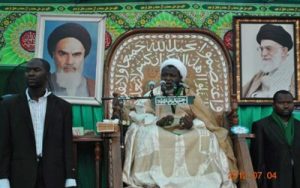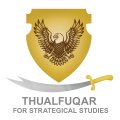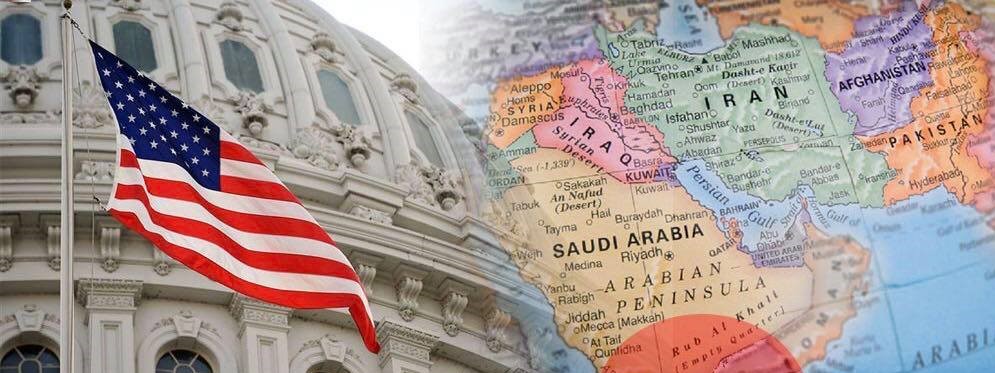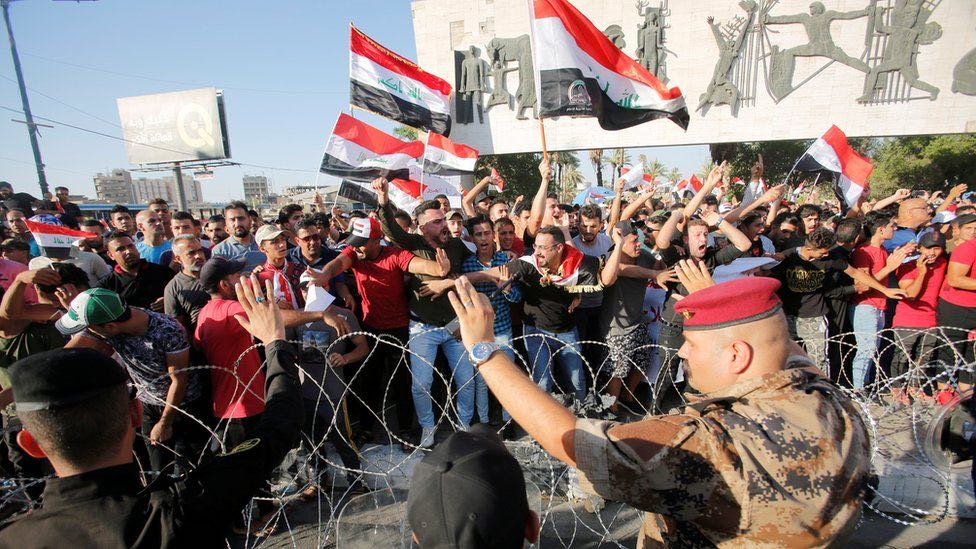Iran has been keen to link the Shiite minorities – wherever they are – ideologically with the project of the Guardianship of the Faqih, which aims to find arms that work in its interest, which will allow it to expand and influence the political stability of those countries.
Iran seeks to extend its influence to most countries of the world of special strategic importance, with rich resources, especially countries in which there is a “Shiite” sectarian base.
Iran has worked to extend the arms of Iranian governmental and non-governmental organizations under social, cultural and economic headings.
This task is carried out by the Ahl al-Bayt World Assembly, which is directly supervised by Supreme Leader Khamenei, and in cooperation with the intelligence service “Etela’at”. And the intelligence of the Revolutionary Guards through the Quds Force, these diverse forces with united means, reveal the nature of Iranian goals.
In this context, African countries were not far from Iranian ambition, as Iran worked to spread the Shiite sect in its Safavid version, similar to what is happening in Iraq, Syria, Lebanon, Yemen and some Arab Gulf countries.
The Shiites did not have a noticeable presence as a sect in Nigeria before the Islamic Revolution in Iran 1979. Years later, Nigeria became known to Shiites at the hands of Ibrahim Zakzaky, who became the Secretary-General of the Muslim Students Association in Nigeria “1977-1978”, as his activity increased during that period, which qualified him to hold several positions. Sensitive in the “Muslim Student Union” at the university, and he made good use of this opportunity, as Zakzaky demonstrated to his colleagues and friends inside the university his goals that focus on the need for reform in the country, support for the oppressed, unity among the Islamic nation, and a return to the authentic approach of Islam, influenced by the slogans of the Islamic Revolution in Iran.
In 1980, Sheikh Zakzaky traveled to Iran in response to an invitation addressed to him, where he met for the first time with Khomeini, and then became a reference for the Khomeini tradition in the Ahl al-Bayt School in Nigeria.
After his return from Tehran, Zakzaky founded the Islamic Movement or the “Islamic Organization” in Nigeria in the early 1980s, to become a body that gathers his supporters and the Nigerian Shiites.
Over time throughout the 1980s, the Zakzaky Group expanded to include tens of thousands of members.
The influence of Shiites has grown in Nigeria, and the scope of the Shiite movement has expanded to the point where their influence is described as a “state within a state” due to the high number of their gatherings in the country and the presence of many associations, foremost of which is the “Islamic Movement” organization in Nigeria, which was founded by Sheikh Ibrahim Zakzaky.
The movement takes the city of Zaria (ZARIYA) as the headquarters of the movement’s leadership, where each leading member of the movement supervises a number of movement delegates in the regions and states within Nigeria.
As for the states and regions, it is divided into departments and circles, then the councils, and each of them is headed by a delegate or agent who is responsible before the leadership council, just as the state is under the leadership of one agent in his capacity as the direct supervisor of all the movement’s delegates and agents in cities, governorates, residential neighborhoods, and villages. located within the state’s geographic boundaries.
On the other hand, there are other departments of institutions, bodies, and organizations that were founded by Zakzaky’s orders or at the suggestion of some members of the movement, for humanitarian or sectarian goals, or social and media services, etc. The directors of those institutions are subject to the supervision of those movement leaders and according to the sequence mentioned above.
movement institutions
The “Shia” Islamic movement established a number of educational and humanitarian institutions inside and outside Nigeria, which work in different fields and levels, and each local administration has independent bodies, and the most important of these institutions are:
1: The Martyrs Foundation
This foundation was established on January 1, 1992 in the city of Zaria. It is a humanitarian organization that takes care of the children of martyrs and sponsors orphans and widows.
2: Al-Zahra Charitable Foundation
This institution was established in 2010, to be the nucleus for the rest of the movement’s institutions, especially those working in the field of social and humanitarian services, such as digging wells, building water canals, freeing prisoners, and helping widows and the needy.
3: Health Foundation
The Foundation is an association of doctors and nurses affiliated with the Islamic Movement who work in the medical field in the public or private sector.
4: Media institutions
The Islamic Movement in Nigeria has media outlets that publish its activities in local languages as well as in English, foremost of which is the daily newspaper “Al-Mizan”, which is published in the Hausa language, as it is considered the striking media force of the Shiite Islamic Movement in Niger. It publishes articles of Shiite clerics, headed by Zakzaky, follows up on their activities inside and outside the country, and is interested in publishing news about Iran.
In addition to the “Al-Mizan” newspaper, here is the “Al-Mujahid” newspaper published in English. They also succeeded, in light of the state of agreement between them and the government, in buying broadcast hours on radio and television in order to broadcast through them their programs that carry their ideas.
There is a website for the Islamic Movement in many languages, foremost of which is the local language “Hausa”, and the English, French and Persian languages.
The organization sponsors a large network of schools, hospitals, and cultural and social centers in northern and southern Nigeria, in addition to economic institutions such as the “Trade Forum”. It also organizes poetry and prose competitions in which prizes are presented to the winners, and it also provides scholarships for young people to study in institutes and universities in Iran.
It also organizes mass demonstrations on various Shiite occasions, such as Ashura and the last Friday of Ramadan, which Tehran has made an international day (for Jerusalem). The organization considers its religious processions and political demonstrations among its important activities as “a means to spread the message of the movement among the people,” although some of these events involved clashes with the police, which resulted in loss of life and property.

military arm
The Islamic Movement, led by Zakzaky, formed a military militia calling itself the Mahdi Army.
This group has a number of armed men trained in Iran, and they have previously attacked the army and security men, as well as launched attacks against Sunni Muslims in several northern cities in an attempt to ignite a sectarian war in the country. The number of militia members is more than 3,000 Nigerian fighters.
Nigeria has become the starting point for spreading the Shiite sect in African countries, as many merchants come to it, in light of the Shiites’ involvement in trade and their establishment of a trade forum to enhance their economic influence to facilitate the process of spreading their doctrine among the incoming merchants.
With the expansion of the Shiite sect, fundamental differences began to emerge between them, which led to the division of the Shiites into two parts. The first part: the “Zakzaky” group, which is hostile to the Nigerian state and describes it as a tyrant, and its supporters have fought many violent clashes with the authority over decades.
While the second section is led by two of the most important followers of Zakzaky previously, namely: Hamza I and Saleh Zaria, both of whom received the sciences of Shiism in Iran, and they defected from Zakzaky, after they considered him ignorant of Sharia sciences, and they expressed a desire to engage in various state institutions, and their activity spread among the youth in universities.
Iran has supported “Sheikh Ibrahim Zakzaky,” whom the Iranian media described as “the leader of the Nigerian Shiites,” under the supervision of Section “7000 – Africa Corps,” which is handled by an officer in the Revolutionary Guards, “Sayyid Ali Akbar Tabatabai,” who holds a passport under the name Taha Musabi.
Observers believe that Iran is seeking, behind the support of Zakzaky and his group, to establish a military militia similar to Hezbollah in Lebanon, to be a tool of pressure on the Nigerian governments, to implement the demands and goals of Iranian policy on the African continent in general and in Nigeria in particular, given its economic and strategic importance, as the most important oil producing countries in the brown continent.
Among the Iranian goals is also the establishment of a political party whose primary goal is to reach power in Nigeria, or to become one of the most important arms of the ruling institutions or to participate in governance, and at the very least it will be the largest opposition party, while ensuring the passage of Iranian politics in Nigeria.
Economic support and social and relief work were among the most important methods that led to the penetration of Iran in Nigeria. Poor families also send their children to learn in schools supported by Iran in Nigeria, which led to the implantation of the Shiite sect in the minds of young people, and they are taught in a number of schools the Persian language. In May 2009, the Iranian Cultural Attaché held a conference at the University of Lagos entitled “What are the challenges in learning the Persian language and its culture in Nigerian society?” Some outstanding students are also selected to be sent to Iran to receive the sciences of the doctrine there and return to spread it in the country and work as teachers in these schools.

terrorist activities:
In December 2010, Western diplomatic sources revealed that the Iranian arms shipment smuggled to Nigeria, which included 13 containers containing construction materials, concealed weapons and cannons sent by the Quds Force and discovered by the Nigerian authorities in the port of Apapa in Lagos, may have been destined for local militias operating in Nigeria and abroad. Such as the “Hisbah” organization that imposes Islamic law in Kano province in the north of the country, the “Baku Haram” organization that is active in the north, and the “Liberation of the Niger Delta” movement that fights for control of oil revenues in the north.
Nigerian sources had said that some of these weapons were destined for Senegal, specifically for the “Democratic Forces in Casamas” movement, which is active in the rebel areas in Senegal, south of Gambia.
According to the sources, the shipment was part of the Iranian strategy to enhance its influence and presence on the African continent, as part of the major mission given to the “African Corps” in the Quds Force, and said that two officers of the Revolutionary Guards, “Azim Aghajani and Tabatabaei” were responsible for the operation, who After discovering the shipment, they rushed to resort to the Iranian embassy in Lagos, and it said that the dismissed foreign minister, Manouchehr Mottaki, succeeded in concluding a deal after exerting great pressure on the Nigerian authorities, to include Tabatabai, who entered Nigeria with a diplomatic passport, to his returning delegation, in exchange for handing over the lower-ranking one to the Nigerian authorities. The sources said that the former may know precisely the details of Iran’s secret activities in Africa.
In February 2013, the Nigerian Intelligence Service announced the discovery of a military cell, which it said was receiving instructions from Iranian elements, and was aiming to attack Israeli and Western targets in Nigeria. A spokesman for the agency, Marilyn Ogar, said at the time that the group also planned to assassinate the former military ruler of Nigeria. Ibrahim Babangida.
Reuters also revealed in late May of the same year that the Nigerian security services found in a house in the northern city of Kano weapons stored by Lebanese citizens and were planned to be used in launching attacks on Israeli and Western targets.

The head of the Kano State Security Department, Bassi Etang, described the house as harboring a terrorist cell linked to the Lebanese Hezbollah. Another army statement stated that the weapons included anti-tank missiles, rocket-propelled grenades, anti-tank mines, anti-personnel and other dangerous weapons. Later investigations indicated that there was a plot to assassinate the Saudi ambassador. In Nigeria, one of the defendants, Ahmed Rawda, admitted this during his trial session in Abuja.
In May 2013, the Nigerian authorities convicted Aghajani and his Nigerian partner and sentenced them to 5 years in prison.
Following the attack of the Nigerian army, on December 12, 2015, on the headquarters of the Islamic Movement and the arrest of Sheikh Zakzaky, Iran officially protested to the state of Nigeria against the attack launched by the army against a small group of Shiites in the town of Zaria (north of the country), and what increased the controversy, the position of the Iranian president , which reflects the position of the Supreme Leader and the regime in Iran, where he made direct contact with his Nigerian counterpart, Muhammad Bukhari, asking him to establish a fact-finding committee on the Zaria incident.
This was followed by a call by the Iranian Foreign Minister, Mohammad Javad Zarif, to his Nigerian counterpart, Jeffrey Onyeama, to request that his government move “immediately and seriously to avoid violence” against Shiites in Nigeria. Tehran also summoned the Nigerian chargé d’affaires to the headquarters of the Iranian Foreign Ministry, which seriously demanded that the Nigerian authorities determine the dimensions of the accident, treat the injured, and compensate for the losses and damages as soon as possible, as reported by the official Iranian news agency, Al-Khabar.
The Iranian official position seemed to be talking about an Iranian community in Nigeria and not about a group of Nigerian Muslim citizens who profess the Shiite sect and who were confronted by the security forces for attempting to stir up riots and disturb security after they targeted a convoy carrying Nigerian Chief of Staff Yusef Buratai in an attempt to assassinate him.
.
This incident would have passed unnoticed had it not been for Iran’s statements, which are considered blatant interference in Nigeria’s private affairs, and they did not rule out that Tehran was behind the escalation that took place against the background of this incident, as dozens gathered in front of the Nigerian embassy in Tehran to protest against the “massacre against the Shiites.” , While another demonstration was organized that included hundreds of students at a university in the Nigerian capital.
The Secretary-General of the Islamic Group in Nigeria revealed the Iranian activity in his country, pointing out that it had trained 3,000 Nigerian youths to join the ongoing conflict in Syria and to join Assad’s forces and the rest of the militias fighting on his side, including Hezbollah.
Dawood Omran, the group’s secretary-general, stated that the fighters that Tehran seeks to send to Syria have undergone the necessary qualification to engage in battles, under the supervision of the Iranian embassy in Abuja and the consulate in Lagos, and called on his country’s government to confront those moves that represent a flagrant challenge and infringement of Nigerian sovereignty and outside the legal framework
He explained that Iran has many projects funded by millions of dollars to convert Muslims in Nigeria, stressing that this policy is implemented by four Iranian institutions at the forefront of which (the Islamic Organization or the Islamic Movement), which is led by Ibrahim al-Zakzaky, who is considered the Sheikh of the Shiites in Nigeria, and through him Iran finances its activities and he has thousands of followers.
The relationship with the Lebanese Hezbollah:

Perhaps the presence of the Lebanese Hezbollah in Nigeria preceded the direct Iranian presence, through the Lebanese communities residing in Nigeria and West Africa.
The Lebanese Hezbollah has economic projects in Nigeria and West Africa, where it runs economic institutions, which are outlets for money laundering across Africa. Recently, the US Treasury Department revealed a network to finance and support the Lebanese Hezbollah, centered in Nigeria, consisting of three people who are active in trade and have supermarkets, hotels, and investment companies. Which they use as a front to cover up suspicious actions, including fundraising, recruitment and monitoring for the benefit of the Lebanese Hezbollah.
Among the names mentioned in the American report are Mustafa Fawaz, a member of an organization affiliated with Hezbollah. He was arrested in Nigeria in 2013 and admitted his affiliation with the party. He also admitted the names of others belonging to the network. As for the second member, his brother Fawzi Fawaz is also a member of the party and has handled foreign relations. in Abuja.
The Nigerian authorities arrested him in possession of heavy weapons, and investigations showed his involvement in various terrorist activities. The third person is Abdullah Tahinah, a prominent member of the Hezbollah group in Nigeria who collects donations for the party. The US Treasury states that he underwent military courses in Lebanon before moving to this African country.







